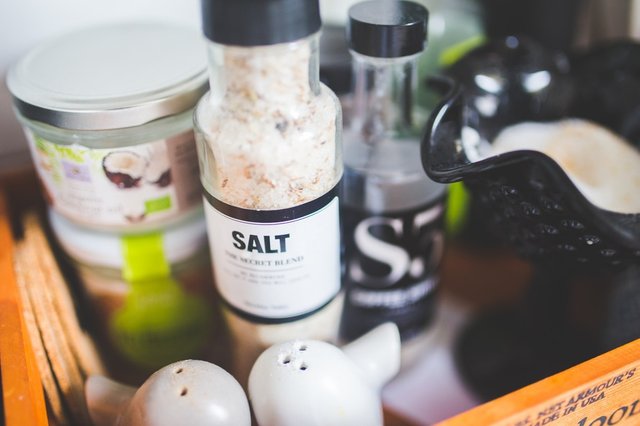How to reduce salt intake? - my 3 tricks to achieve it

As my body condition changed recently (luckily nothing serious), I started to observe and reduce my daily salt intake carefully.
Salt is not always our enemy. Actually our body needs it. But also it causes bloating, which I want to avoid, and for longer term one may suffer from kidney disorder, heigh blood pressure, heart disease, stroke by consuming too much salt. It's good to know appropriate amount. According to a fact sheet titled "Salt reduction" from WHO,
High sodium consumption (>2 grams/day, equivalent to 5 g salt/day) and insufficient potassium intake (less than 3.5 grams/day) contribute to high blood pressure and increase the risk of heart disease and stroke.
Most people consume too much salt—on average 9–12 grams per day, or around twice the recommended maximum level of intake.
Less salt means boring meal? Not at all ... or may be yes in the beginning but you won't think so after a while. I could manage to reduce my daily salt intake with following 3 tricks:
- Add sourness and umami instead of saltiness
- Eat seasonal
- Use good salt
About adding sourness, I learned how much sourness is important on an online course "Science & Cooking: From Haute Cuisine to Soft Matter Science" by Harvard University, it's not a course to learn nutrition though. Lemon, lime and varieties of vinegar help me a lot to season food :) Umami works well too. In Japan some hospitals have special salt reduced meal utilizing Umami. And good thing is that Umami is not for Japanese. We don't need seaweed, bonito flakes ... to make the taste. Mushrooms and veggies can also produce Umami.
Eating food in season is ... it's because seasonal produce has the best taste in the year so they don't have to be seasoned or salted so much. Good to keep our budget low too.
Last but not least, recently I got to know at friends' kitchen that it's well worth investing some money on good salt. I used to have non-refined & non-iodized sea salt, which wasn't a bad one. But good ones taste different and I just need less to season. Literally "a pinch of salt" as cookbooks say.
Still do you think it's difficult to reduce your salt intake? You will notice you feel good without bloating in the evening, and your sense of taste becomes more delicate within few weeks (I read somewhere before it takes 2 weeks).
Trust me, and give it a try!
P.S. If you are interested in learning nutrition basics, my favorite course is "Child Nutrition and Cooking" on coursera by Stanford University. It's not only for parents and kids but also for adults. Don't worry, it's easy going, not like a formal university lecture ;)
* Photo is from https://www.pexels.com/photo/side-view-of-a-bottle-with-salt-6401/
nice post.
What kind of salt do you suggest?
I tried Camargue and Cervia and both taste good.
Thank you for the comment, rigel. It cheers me up as I started steemit few days ago :)
About salt, I'm not sure I can recognize the exact taste difference between salt from mountain and sea but I like sea salt probably because I grew up in Japan. Texture wise flaky and a bit wet (?) one becomes my favorite. For decoration, it was inspiring to see some people sprinkle Hawaiian sea salt to add black color on a plate :)
Amazing! Would love to see more quality posts like this!
Thank you sakshath :)
this article is pointless and full of country lores. waste of time
日本の方?
そうです :)
お、嬉しいです^ ^よろしくお願いいたします^ ^
こちらこそ!